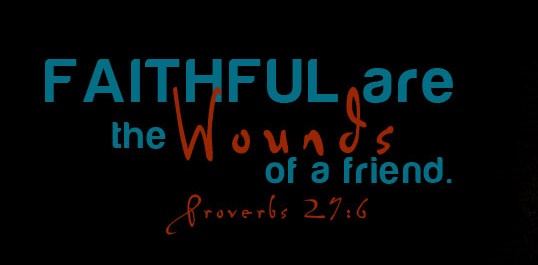My four-year-old grandson stood in front of my chair just staring at me with a puzzled look. He was literally two feet from my face. He said nothing for a moment, so I asked, “Judah, are you okay?”
Judah looked at me and said, “Why is your face so red? It “wooks” kind of like a “cwown’ (clown).” I chuckled and said, “I have on something called blush. Do you think it’s too red?” Judah nodded his head.
I got up and looked into a mirror. Because the room was sunny and bright, I could see that indeed, my cheeks were a little too blushy. I proceeded to take a tissue and wipe off some of the blush. After a few strokes of the tissue, I asked Judah if it looked right now, and he answered me in the affirmative.
Earlier that morning, I had put on a little blush, but I did not turn on the lights. I thought I could see well enough in the natural light, but once the bright light shined on my face, I could see the correction that was needed. But I would never have looked at my face if someone who loved me had not pointed it out to me.
Who do you have in your life that you allow to correct you when something is off spiritually? Maybe even something you do not see in yourself. Let’s face it: Accepting correction can be hard. It is easy to fall into thinking that we know best and that someone else does not have the right to tell us to change. Oftentimes, we interpret correction for judgment.
Hebrews 12:11 says, “No discipline seems pleasant at the time, but painful. Later on, however, it produces a harvest of righteousness and peace for those who have been trained by it.”
Proverbs 27:6 says, “Wounds from a friend can be trusted, but an enemy multiplies kisses.” I believe that a loving rebuke is one of the highest forms of love that one person can express to another.
It is painful to be corrected, and it is painful to be the one doing the correcting. As I look back through the years, I can pinpoint painful experiences when a friend or friends cared enough about me to wound me. I hate to think of where I might be today had they kissed-up to me rather than showing me things that were harming my growth in Christ and my efforts at ministry. I am a stronger person today because of these friends. These were friends that I knew loved me and cared about my walk with God, not someone I hardly knew who just did not like something about me.
When someone corrects you, or points out an area where you might need to grow, what is your first reaction? Let me guess. It is probably not, “Thanks, I was really hoping someone would point that out to me.”
We all have “blind spots”—negative parts of our life or character that we cannot see. Sometimes, we even know we are willfully walking in sin. We all need someone who loves us and will say, “You need to get this out of your life.” A true friend will love us enough to tell us the truth, even at the risk of hurting our feelings.
We all need at least one friend, a good, godly friend who inspires us to be more like Christ — a friend who is positive and encouraging, but painfully honest when needed. If you do not have a friend like this, ask God to help you find one. Such friends have been some of the greatest blessings in my Christian walk.
In Second Samuel chapter twelve, there is a story that illustrates the need to have someone who will speak the truth in love. It is the story of King David who lusted after a married woman named Bathsheba. When she became pregnant with his child, he had her husband killed and married her to cover up his sin.
However, this sin was not hidden from God. Thus, the Lord sent Nathan to David with a message.
Nathan told David a story of two men, a rich man, and a poor man. The rich man had a large number of sheep, while the poor man only had one little lamb that he loved dearly and treated like his own child. When a traveler came to the rich man, instead of slaughtering one of his own sheep, the rich man took the poor man’s lamb and prepared it for the traveler to eat.
David responded with great anger. “As surely as the Lord lives, the man who did this must die! He must pay for that lamb four times over, because he did such a thing and had no pity” (2 Samuel 12:5-6).
Nathan replied, “You are the man!” David had everything, but still took another man’s wife. David had been described as a man after God’s heart, yet he needed a Nathan to say, “Look what is in your life.”
Nathan did not do this so he could let David have a piece of his mind. He did it for David to come back into alignment with God. David repented of this wrongdoing (which he writes of in Psalm 51).
Every one of us needs a Nathan. We get so used to our sins that often we have become blind to them, or sometimes simply enjoy having them around. We do not even notice them anymore. We all need bold, loving Christian friends who call us to repentance.
“Everybody Needs a Nathan!” Who is yours?

